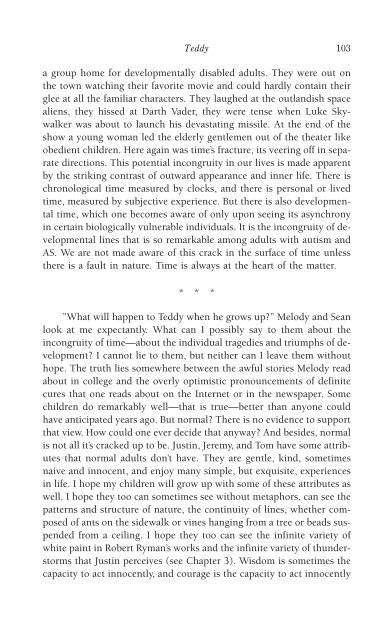978-1572305441
autism
autism
You also want an ePaper? Increase the reach of your titles
YUMPU automatically turns print PDFs into web optimized ePapers that Google loves.
Teddy 103<br />
a group home for developmentally disabled adults. They were out on<br />
the town watching their favorite movie and could hardly contain their<br />
glee at all the familiar characters. They laughed at the outlandish space<br />
aliens, they hissed at Darth Vader, they were tense when Luke Skywalker<br />
was about to launch his devastating missile. At the end of the<br />
show a young woman led the elderly gentlemen out of the theater like<br />
obedient children. Here again was time’s fracture, its veering off in separate<br />
directions. This potential incongruity in our lives is made apparent<br />
by the striking contrast of outward appearance and inner life. There is<br />
chronological time measured by clocks, and there is personal or lived<br />
time, measured by subjective experience. But there is also developmental<br />
time, which one becomes aware of only upon seeing its asynchrony<br />
in certain biologically vulnerable individuals. It is the incongruity of developmental<br />
lines that is so remarkable among adults with autism and<br />
AS. We are not made aware of this crack in the surface of time unless<br />
there is a fault in nature. Time is always at the heart of the matter.<br />
* * *<br />
”What will happen to Teddy when he grows up?” Melody and Sean<br />
look at me expectantly. What can I possibly say to them about the<br />
incongruity of time—about the individual tragedies and triumphs of development?<br />
I cannot lie to them, but neither can I leave them without<br />
hope. The truth lies somewhere between the awful stories Melody read<br />
about in college and the overly optimistic pronouncements of definite<br />
cures that one reads about on the Internet or in the newspaper. Some<br />
children do remarkably well—that is true—better than anyone could<br />
have anticipated years ago. But normal? There is no evidence to support<br />
that view. How could one ever decide that anyway? And besides, normal<br />
is not all it’s cracked up to be. Justin, Jeremy, and Tom have some attributes<br />
that normal adults don’t have. They are gentle, kind, sometimes<br />
naive and innocent, and enjoy many simple, but exquisite, experiences<br />
in life. I hope my children will grow up with some of these attributes as<br />
well. I hope they too can sometimes see without metaphors, can see the<br />
patterns and structure of nature, the continuity of lines, whether composed<br />
of ants on the sidewalk or vines hanging from a tree or beads suspended<br />
from a ceiling. I hope they too can see the infinite variety of<br />
white paint in Robert Ryman’s works and the infinite variety of thunderstorms<br />
that Justin perceives (see Chapter 3). Wisdom is sometimes the<br />
capacity to act innocently, and courage is the capacity to act innocently



